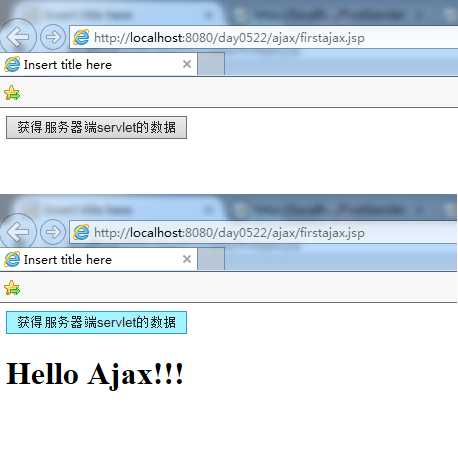标签:
jsp页面--firstajax.jsp
<%@ page language="java" contentType="text/html; charset=UTF-8" pageEncoding="UTF-8"%> <%@taglib prefix="c" uri="http://java.sun.com/jsp/jstl/core" %> <!DOCTYPE html PUBLIC "-//W3C//DTD HTML 4.01 Transitional//EN" "http://www.w3.org/TR/html4/loose.dtd"> <html> <head> <meta http-equiv="Content-Type" content="text/html; charset=UTF-8"> <title>Insert title here</title> </head> <script type="text/javascript"> //使用function获取XMLHttpRequest对象 function createXMLHttpRequest(){ try{ return new XMLHttpRequest();//一般的大众的浏览器 }catch(e){ try{ return new ActiveXObject("Msxml2.XMLHTTP");//IE6 }catch(e){ try{ return new ActiveXObject("Microsoft.XMLHTTP"); //IE5.5及以下 }catch(e){ alert("你的浏览器是远古时代的吗?"); } } } }; window.onload= function(){ var btn = document.getElementById("btn"); btn.onclick = function(){ //1.得到对象 var xmlHttp = createXMLHttpRequest(); //2.打开连接 xmlHttp.open("GET","<c:url value=‘/FirstServlet‘/>",true); //3.发送请求 xmlHttp.send(null); //4.接收服务器响应 xmlHttp.onreadystatechange = function(){ if(xmlHttp.readyState ==4 && xmlHttp.status == 200){ var text =xmlHttp.responseText; //完成逻辑 var h1 = document.getElementById("h1");//获得h1标签 h1.innerHTML = text ;//把服务器响应的信息写到h1标签中 } }; }; }; </script> <%-- 1.给一个按钮,以及一个标题 2.点击按钮时向服务器发送一步请求,得到结果 3.把响应结果显示到标题中 --%> <body> <button id = "btn">获得服务器端servlet的数据</button> <h1 id="h1"></h1> </body> </html>
Servlet-->FirstServlet.java
package ajax; import java.io.IOException; import javax.servlet.ServletException; import javax.servlet.http.HttpServlet; import javax.servlet.http.HttpServletRequest; import javax.servlet.http.HttpServletResponse; public class FirstServlet extends HttpServlet { private static final long serialVersionUID = -1866369869941762275L; public void doGet(HttpServletRequest request, HttpServletResponse response) throws ServletException, IOException { response.getWriter().print("Hello Ajax!!!"); } }
图片展示:

标签:
原文地址:http://www.cnblogs.com/vmkash/p/5521316.html